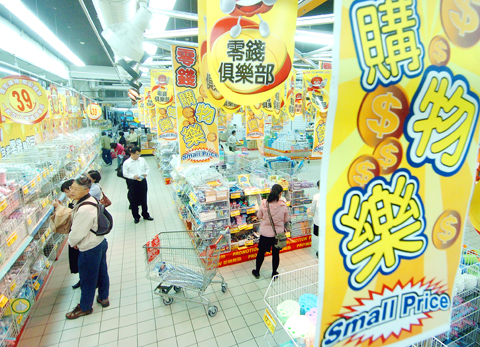The planned distribution of shopping vouchers would help boost retailers and other service sectors, but more stimulus measures are needed to lift domestic demand amid the looming global recession, economists said yesterday.
In another bid to mitigate the effect of external financial shock, Premier Liu Chao-shiuan (劉兆玄) unveiled details yesterday afternoon of a plan to give out shopping vouchers valued at NT$3,600 (US$108.32) to all citizens to help businesses weather the economic downturn.
The measure, intended to raise GDP growth by 0.64 percentage points next year using NT$82.9 billion (US$2.5 billion) in special funding, came two days before the state statistics agency is scheduled to update major economic pointers.

PHOTO: CHANG CHIA-MING, TAIPEI TIMES
Liang Kuo-yuan (梁國源), president of Polaris Research Institute (寶華綜合經濟研究院), said that the policy could trigger a positive business cycle as increasing consumer spending would boost domestic demand.
However, Liang said it was too early to gauge its full impact.
“With consumers spending more, industries will supply more goods and services,” Liang said. “The trend may spell more employment opportunities and increase personal disposable income.”
The timing of the distribution will play a crucial role in the policy’s effectiveness, the academic said, suggesting that the government carefully consult the economic indicators to be released tomorrow.
“The vouchers would have less effect if they were distributed when people have just received their pay or as GDP hits a new low,” Liang said. “The longer the distribution takes, the weaker its impact on the economy will be.”
The Cabinet still needs to obtain approval from the legislature before it can distribute the vouchers.
Liang said that more stimulus measures would be necessary if the nation’s economic situation turns out to be worse than expected.
The government is set to lower next year’s GDP growth forecast, with all major trading partners, except China, expected to post negative growth.
Chen Miao (陳淼), a research fellow at the Taiwan Institute of Economic Research (台經院), said domestic service providers may breathe a long-awaited sigh of relief once the policy is put into practice.
The sectors have suffered falling profit margins on surging raw material costs and slumping consumer spending, Chen said.
But Chen said it remained to be seen if the plan would turn out a burden on the national treasury, with the government already promising a spate of tax cuts and outlays.
Christina Liu (劉憶如), the top adviser at Daiwa Institute of Research Co, said the stimulus measure would be good for domestic consumption and economic growth, but that the government should take steps to prevent forgery and other problems to maximize its impact.
To that end, Liu said it made more sense for the government to give the vouchers to individuals rather than households whose sizes vary.
“It would not be fair for singles to receive the same amount as families with children,” Liu said.
The Cabinet originally intended to distribute the vouchers to all individual households with an annual income of NT$1.2 million and below, but policymakers argued the restriction would have turned the plan into a welfare subsidy rather than an economic stimulus.
“There is no need to exclude the rich from the measure as they pay their share of taxes,” Liu said.

RUN IT BACK: A succesful first project working with hyperscalers to design chips encouraged MediaTek to start a second project, aiming to hit stride in 2028 MediaTek Inc (聯發科), the world’s biggest smartphone chip supplier, yesterday said it is engaging a second hyperscaler to help design artificial intelligence (AI) accelerators used in data centers following a similar project expected to generate revenue streams soon. The first AI accelerator project is to bring in US$1 billion revenue next year and several billion US dollars more in 2027, MediaTek chief executive officer Rick Tsai (蔡力行) told a virtual investor conference yesterday. The second AI accelerator project is expected to contribute to revenue beginning in 2028, Tsai said. MediaTek yesterday raised its revenue forecast for the global AI accelerator used

Taiwan Semiconductor Manufacturing Co (TSMC, 台積電) has secured three construction permits for its plan to build a state-of-the-art A14 wafer fab in Taichung, and is likely to start construction soon, the Central Taiwan Science Park Bureau said yesterday. Speaking with CNA, Wang Chun-chieh (王俊傑), deputy director general of the science park bureau, said the world’s largest contract chipmaker has received three construction permits — one to build a fab to roll out sophisticated chips, another to build a central utility plant to provide water and electricity for the facility and the other to build three office buildings. With the three permits, TSMC

TEMPORARY TRUCE: China has made concessions to ease rare earth trade controls, among others, while Washington holds fire on a 100% tariff on all Chinese goods China is effectively suspending implementation of additional export controls on rare earth metals and terminating investigations targeting US companies in the semiconductor supply chain, the White House announced. The White House on Saturday issued a fact sheet outlining some details of the trade pact agreed to earlier in the week by US President Donald Trump and Chinese President Xi Jinping (習近平) that aimed to ease tensions between the world’s two largest economies. Under the deal, China is to issue general licenses valid for exports of rare earths, gallium, germanium, antimony and graphite “for the benefit of US end users and their suppliers

Dutch chipmaker Nexperia BV’s China unit yesterday said that it had established sufficient inventories of finished goods and works-in-progress, and that its supply chain remained secure and stable after its parent halted wafer supplies. The Dutch company suspended supplies of wafers to its Chinese assembly plant a week ago, calling it “a direct consequence of the local management’s recent failure to comply with the agreed contractual payment terms,” Reuters reported on Friday last week. Its China unit called Nexperia’s suspension “unilateral” and “extremely irresponsible,” adding that the Dutch parent’s claim about contractual payment was “misleading and highly deceptive,” according to a statement